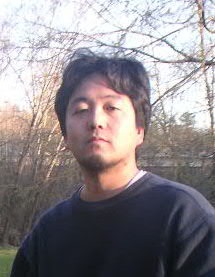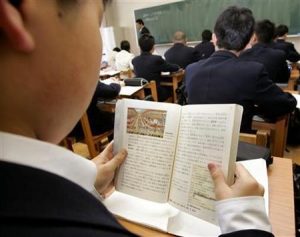Memo #144
By Kazuya Fukuoka – kfukuoka [at] sju.edu
 History textbook controversies in Japan (教科書問題) focus on “facts” about particular events and question specific phrasing and numbers. In the past, Chinese and South Korean governments have charged that Japanese government-screened history textbooks allegedly trivialized and/or justified past atrocities.
History textbook controversies in Japan (教科書問題) focus on “facts” about particular events and question specific phrasing and numbers. In the past, Chinese and South Korean governments have charged that Japanese government-screened history textbooks allegedly trivialized and/or justified past atrocities.
But the reception of history textbooks is often overlooked. We need to pay more attention to how students perceive, learn, and internalize information in history textbooks.
Four factors influence how Japanese students receive information in history textbooks. First, history textbooks focus on empirical facts and are not designed to enhance critical analytical skills. They describe what and how rather than why. Students often find classroom lectures and discussions superficial.
Second, Japan’s competitive entrance examination system and its focus on memorization (暗記) discourages analytical thinking in history education. Students memorize terms and chronology for entrance examinations, but they forget what they studied afterwards.
Third, because of the ideological tension between liberal and conservative teachers in schools, Japanese students are often not exposed to the controversial parts of Japanese history. For example, if progressive teachers discuss Japan’s military aggressions with their own ideological bent, it would likely invite implicit or explicit interference from conservative teachers and vice versa. Many teachers avoid trouble by not making normative judgments and comments on contentious issues.
Lastly, history textbooks are not perceived as an effective source for nurturing Japanese students’ underlying perceptions and feelings about Japan’s past wrongs. Instead, students learn about Japan’s militaristic past and reflect on Japan’s war responsibility through television, documentaries, news, films, school trips to war museums, conversations with family members, and interactions with Asian neighbours.
History textbooks may be useful to help readers grasp the chronology of historical events. But when it comes to how students reflect upon controversial history issues, history textbooks play a much smaller role than often assumed. While contestation about the content of history textbooks is an important aspect of domestic and international memory wars, this only provides a partial picture. The part of the picture we are missing is the intended audience of the history textbooks – the students.
About the Author:
Kazuya Fukuoka – Assistant Professor, Department of Political Science, Saint Joseph’s University.
Links:
- Fukuoka, K. “School History Textbooks and Historical Memories in Japan: A Study of Reception,” International Journal of Politics, Culture, and Society, 2011.
- Postwar History Education in Japan and the Germanys: Guilty Lessons, Book by Julian Dierkes, March 2010.
Related Memos:
- How Finnish, not East Asian Education Became a Global Reference (Memo #132, by Keita Takayama – Japanese translation here)
- OECD’s PISA, Media Sensationalism, and Education Reform in Japan (Memo #47, by Keita Takayama – Japanese translation here)
- 65 Years After The Asia Pacific War: The End of History Politics? (Memo #15, by Julian Dierkes)
- Is South Korea’s Hyper-Education System The Future? (Memo #2, by Julian Dierkes)
